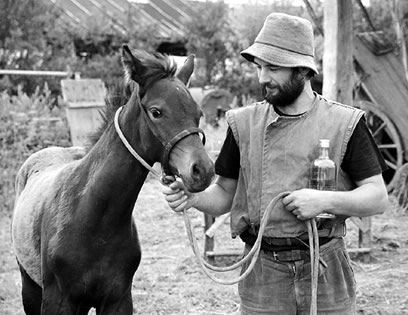 It is not easy to introduce such a long experienced band as Vezhliviy Otkaz (“Polite Refusal” in English). We can finally know better this excellent group thanks to AltrOck label that is distributing in Europe its newest album “Geese & Swans”. We strongly recommend you listening to this music, especially if you love chamber and avant-garde rock music. In the meantime let’s read this beautiful interview with the band leader Roman Suslov. It is not easy to introduce such a long experienced band as Vezhliviy Otkaz (“Polite Refusal” in English). We can finally know better this excellent group thanks to AltrOck label that is distributing in Europe its newest album “Geese & Swans”. We strongly recommend you listening to this music, especially if you love chamber and avant-garde rock music. In the meantime let’s read this beautiful interview with the band leader Roman Suslov.
In 1985 you published your first magnetoalbum (non official release A/N) “Opera-86” (“Опера-86”). At that time there was a large, unofficial or clandestine, underground rock movement in U.S.S.R. Compared with many of these groups, your music is original and complex. What did you think about the underground rock groups of the Soviet era? Which position had Вежливый Отказ towards this movement? Did you feel a part of it?
The very difference of the underground rock of that time (same as modern) from other musical genres consisted in the absence of music. It was rather a melodeclamation, however, there were few people concerned with melo (few – 'malo' in Russian, ‘melo malo’ – pun intended for the Russian speakers). There were exceptions, but they were dependent, derivative and provincial. Everybody was in protest and tried to be as provocative as possible with most of the acts being simply unclear. Some performers were a success, putting on a daring and powerful show. But on the whole, the rock of the time as a textual and terminological phenomenon was purely local, isolated, not accessible or comprehensive outside of Russia. Vezhliviy Otkaz (Polite Refusal) was groping its way and trying to find means of putting itself in a standalone position musically, so as to keep aside and act in parallel, but, of course, in contrast with other rock groups.
At that time were you free to play your music? How did you manage to record “Opera-86”? What kind of equipment did you have at your disposal?
Yes, I was absolutely free. I abandoned my work as an engineer, I left my wife too, and only engaged myself with music. The first part of the opera was composed in the apartment of P.P. Plavinsky, keyboard player and co-author. We had a handmade mixing console with antiphase channels (so that when played mono, some instruments just cancelled each other out). V. Alisov, a friend of mine, brought along a 2-channel Tascam recorder. Homemade guitars. Yamaha RX-11 drum machine. Korg synthesizer. The second part was recorded with a live drummer, M.Mitin, in a studio in a regional Militia School (Special Purpose Police Unit base) with support from by Colonel V. Baklanov, a music fan.
What were your main sources of inspiration at the very beginning? I know that there were some underground musical groups playing a kind of chamber rock music, such as Sonans from Sverdlovsk. Did you have contacts with any of these groups?
I had neither inspiration nor contacts – just protest music.
We were in the middle of the Perestroika era when you published your first official LP (the “white album”) for the State label Melodiya. How did Vezhliviy Otkaz become an “official” group?
Vogue. Flirting with misfits was vogue. Some of the avant-garde members of the party in Komsomol (Communist Union of the Youth) happened to be enthusiasts. They advised people on what was vogue.
With “Ethnic Experiences” ("Этнические опыты") your sound became more mature, personal and began to resemble to your current musical style. What experiences and what factors were most significant for the development of your new musical style? The title "Этнические опыты" refers to ethnic music but I can’t find in this album any folk tunes. What kind of ethnic experiences can we find in your music?
It looks like this is an ethnos that does not exist (borrowed definition). It is rather going back to one’s roots, authentic nature. Well, in fact, it is rather difficult to recall now what that was supposed to mean back then. Most likely, it was just that a convenient and handy form of ostinato turned up, allowing both, tonal improvisations and dramatic culminations. And the moving ninths of the accompaniment, creating constant tension. We wanted to marry a simple and lyrical tune with an internally turbulent rhythmic and harmonic support. It’s like I am humming some familiar sweet tune but my soul is on fire!
"Ethnic Experiences" was published by the Finnish music label “Rockadillo”. How did you get in touch with this label?
Finns... Among the capitalists, they are the closest to Saint-Petersburg. The fist rock club in the country opened in Saint-Petersburg. Saint-Petersburg is close to Moscow. A close friend of mine, S. Lagoyskiy, who at that time was the biggest friend of the Finnish people in the SSOD (Soviet Societies for Friendship and Cultural Relations with Foreign Countries, a state organization) was a meloman and a promoter of the Soviet art. Everything matched (He gives a funny Finnish twist to the Russian word for ‘matched’: “sovpalo”).
”I-I-raz” (“И-и раз!..”)is considered one of the most mature and beautiful albums of yours. It is inspired by some famous dance tunes but despite this the songs are not suitable to be danced! How did you come up with this original idea? Is it true that you made it in a very short time?
You are quite right, although dancing is possible and I know how. The idea is not new and it is simple; a typical postmodernist technique is creating a new context for clichés. The context here is always varying, though. I came up with that on a tour in Italy, we put that together very quickly, taking 3 days to record and 3 days to mix.
In 2002 Vezhliviy Otkaz decided to stop his activities and farewell gigs were set. In 2006 there was a restart. What happened at that time and why did you finally change your mind?
I lived in a far off village, breeding horses and horseback riding tourists. I was so absorbed in my rural life that it eclipsed everything else, making me unable to play or compose. And bang! A horse breaks my leg. And here I am in Moscow, away from the pastures. Moscow-based musical–loving friends came along and started luring me with big money. And I took the bait.
 I think that your latest album “Geese and Swans” (“Гуси-Лебеди”) is the best one in your discography (even if I must really admit that it is a hard choice). It seems to me truly complete and I find it very close to another beautiful album such as “Steel on Stone” (“Коса на камень”). How did it happen that you decided to return to such sound, after a jazzier album like “Geranium” (“Герань”)? I think that your latest album “Geese and Swans” (“Гуси-Лебеди”) is the best one in your discography (even if I must really admit that it is a hard choice). It seems to me truly complete and I find it very close to another beautiful album such as “Steel on Stone” (“Коса на камень”). How did it happen that you decided to return to such sound, after a jazzier album like “Geranium” (“Герань”)?
Each new piece is a reflection of a certain period in life, to some extent everything I do is my reality. Ideas, concepts are more like decorations, patterns. I invent little, it comes by all by itself. The similarity between the two albums mentioned above is only in the principles of rhythmic patterns, but as P. Tonkovid, a saxophone player, has justly noted, in “Kocа” I am learning to talk and in "Гуси" I am blabbering on.
Why such a strange title like “Гуси-Лебеди”? Would you like to explain it?
It is as weird as any Russian folk saying: tary-bary, shalyay-valyay, humpty-dumpty. But there is also a metaphysical side to "Гуси—лебеди" as well, as we are watching the clouds drift by.
During your live gigs you often change the arrangements of the songs and there is room for improvisation. What is the importance of the improvisation and the live experience in the process of composing new songs?
Improvisation and live gigs are of no consequence to the process of composing music: the only result is building up of annoyance because you are repeating the same thing all over.
In 2009 you made a cooperation with Persimfans Orchestra (the first Orchestra without conductor founded in 1922 and recently reformed A/N). How did it started and what remained from this experience?
No big deal. Just a whiff of fresh air, string support in some of our compositions and besides, I sang the ‘4 Newspaper Advertisements’ by A. Mosolov (Russian composer of XX Century A/N). But the context is important and fortunate, as it is very difficult for us, living in the post Soviet Union environment to find a right context for presenting our music to the audience and making sure that it is appropriately perceived.
I read that you played in Europe and also in Italy time ago. Do you have any special memories to share with us and your Italian fans?
We’ve played in Italy many times and the audience has always been friendly and responded well. We've been lucky. Italy is the only place where, with support from our friends, we have been able to perform for the target audience and not for some random visitors with a 'red wave' label. Italy is my first foreign trip away from a closed country. You can never imagine how it feels.. and what it means to me.
Thanks to Slava Nedeoglo for the precious help

|